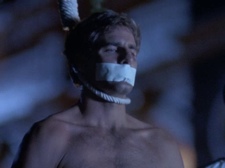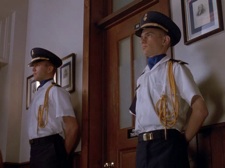“Running for Honor”: June 11, 1964
(Original air date: January 15, 1992)
Sam leaps into a Naval Academy track star named Tommy York on the eve of a big competition. The race has grown into something of a grudge match—his school, Prescott Academy, has been losing to a rival school for years. But Sam is there to grapple with grudges far more insidious: Tommy’s roommate and good friend Phillip has been expelled from Prescott…for being gay.
Considered by some fans to be the most controversial Quantum Leap ever, “Running for Honor” takes place not long before (and glancingly mentions) the Stonewall Riot, an event considered by most to be the birth of the U.S. gay rights movement. Tolerance in the world at large in 1964 is rare enough, but within the patriarchy-rich environment of the military, it is essentially non-existent. Tainted by association with Phillip and on a quest to prove that another of their other classmates is behind a series of local gaybashings, Sam ends up in deep trouble with remarkable alacrity.
Meanwhile, Al is showing the limits of his usual “live and let live” attitude, by voicing traditional establishment arguments against having queer soldiers in the armed forces.
I selected “Running for Honor” for this rewatch project because of all Quantum Leap’s “issue” episodes, it seemed most pertinent to me—I’m queer, I’ve been gaybashed, and I remember the specific tenor of homophobia in the 1990’s—when the episode aired—vividly. Now, twenty years later, I also have a shiny legal marriage Certificate from the Province of British Columbia, which is my personal touchstone for the possibility of change.
I sat down to view the episode in the same week that the topic hit Glee in the form of the episode “Furt.” (I blogged about this episode in detail, and about the It Gets Better project, here). The parallels were amazing: Sam (as Tommy) and Kurt Hummel are targeted by beefy aggressive guys full of hate, all within a school environment. Both Sam and Kurt advocate for themselves beautifully, and in both cases their natural allies come close to letting them down because, on some level, they don’t get it.
To see the same story told, within two days, at this twenty-year remove from each other was to me a startling reminder that societies can change, but human nature is more intractable.
Our collective taboos do, of course…and television can only reflect that. On Glee, Kurt is openly, proudly gay. In “Running for Honor,” Sam’s merely accused of homosexuality. Quantum Leap takes a cautious approach to this material by never specifying whether the real Tommy York is or isn’t bent.
In the nineties, of course, this was tricky ground for a network series to be covering at all. One of the Quantum Leap’s big conventions—and a thing that makes it such a delight—is that Sam always absorbs some personality traits from whoever he’s leaped into. Having him actually swoon in the direction of a fellow cadet, I’m sure, must have seemed like taking things too far. So we end up with “Don’t ask, don’t tell”: “Running for Honor” never answers the question of Tommy’s gender preference. In a peculiar twist of art prefiguring life, it aired just about a year before this approach became official U.S. policy on gays in the military.
As Sam copes with the violent backlash against Tommy, Al accuses him of seeming, essentially, more effeminate. This carries the story onto the slightly safer ground of stereotyping, and away from any suggestion that Sam’s inner Leapee might find boys hot.
(And it says so much, doesn’t it, that it’s more okay for him to wear a dress than to have a homoerotic thought?)
 This delicate “is he, ain’t he” dance is quite possibly the reason why I found this episode, and Bakula’s performance, strangely distancing. Ultimately, Sam is there to save Phillip from himself—the expelled student has decided to frame his tormentors for murder, forcing Sam and the track coach to talk him out of hanging himself. This plot lets the bashers off the hook without really nailing Phillip’s suicidal distress on their abuse.
This delicate “is he, ain’t he” dance is quite possibly the reason why I found this episode, and Bakula’s performance, strangely distancing. Ultimately, Sam is there to save Phillip from himself—the expelled student has decided to frame his tormentors for murder, forcing Sam and the track coach to talk him out of hanging himself. This plot lets the bashers off the hook without really nailing Phillip’s suicidal distress on their abuse.
But there is something that works for me in this, and works well—and it is Al. He is honest and up-front about his feelings when he’s saying the Navy should exclude gays, and as peculiar as some of his arguments may seem, they were widely held and deeply felt. I’m sure there are people out there who still believe every word he utters on this subject is absolutely true. It’s harsh, it divides him and Sam painfully, and as a result, the thoughtfulness and sincerity shine through when he reconsiders his position.
In “Running for Honor,” Sam saves one life and one career, and he changes a couple of minds as he goes. It’s not bad for a leap’s work. Then he’s off again, just in time to let Tommy—gay, straight, or whatever—simply be a runner, and to win the big race for Prescott.
A.M. Dellamonica writes novels and short fiction and teaches writing online. She is passionate about environmentalism, food and drink, and art in every form, and dabbles in several: photography, choral music, theater, dance, cooking and crafts. Catch up with her on her blog here.











I thought I had seen every episode but I am wrong…I don’t remember this one at all. When this series aired I was right into my developing teen dating years…
first time comment, frequent reader. I have very much enjoyed the Quantum Leap revisiting. I remember really enjoying the show when it was on and the acting and storytelling was always engaging.
On this particular episode I am also reminded of the social climate of the late ’80s and early ’90s when the media attempted to make social inroads for the “gay” community.
It was something on the minds of many people as people became more insistant on recognition and the looming specter of AIDS and the muddled information about it became more and more of a presence in the world. (my world only being America but it, like homosexual behavior was not limited to just the lower 48)
One of the things that I did not like then and still find distasteful now is that it is easier for the media to present people who are interested in same sex relationships as victims instead of as people. It is more dramatic and it does touch on a layer of reality for many people but it also reinforces the idea that to be gay is to be a victim so it is marginally acceptable to have harrasment because it is something a person has to go through to “be gay”.
Which, of course, is a load of crap. It happens because other people are jerks. It has nothing to do with wanting to be in a relationship with someone you care about. It is, however, dramatic. As story telling is want to be.
Also a big issue that I did not like in the ’90s was that the good gays were dead or dying gays. A terrible subliminal message to send to both straight and gay people.
You can only appreciate them once they are dead because then you realize how much you miss the person. (ie dead people cannot have sex.) This, to me (and this is only my opinion) plays a role in teen suicide in some ways as much as the harrasment plays a role.
I am not saying this is a bad episode of Quantum Leap for approaching the subject the way it does. It could not get aired any other way at the time. But I will say that it does not really do that much good for the general understanding that a person who wants to be in a relationship with someone they care about does not need to be harrased or treated differently to qualify as a valid person with a valid relationship. Nor do they need to die or attempt to die to be respected for who they are.
To be fair to the media they have been attempting to have living gays on shows for the last few years. Unfortunately I have not liked any of the shows and found the characters to not be a big step forward. a tiny step forward sure but still there is a dissmissive, comedic sensibility to the characters existence which may reinforce subcioncious behaviors in both the straight and gay communities. I know it is idealistic to hope for evolved conciousness in general but isn’t that the underlying mode of a science fiction or fantasy reader; to be idealistic – to hope for better things?
Maybe it is just people in general. I do not know.
Anyway. I hope I made some sence. It all sounds good in my head and then I never know if I missed something between point A and point B.
I loved Quantum Leap. Never understood why it got bounced. Then again, any show I like usually ends up going sideways with the exception of NYPD Blue.
Whoot Canada! Represent!
Woof™.
Terrific recap!
I’d never seen this ep – I watched a bunch of them the last summer before they dropped it, and his empathy for people really caught me. He was always kind of extra-fantastic when he played a woman, because of his sincerity, not because he was especially believable as a “woman” – I’ll see if I can find this on Hulu somewhere.
Yes, exactly–it’s never that we believed he was the person he’d leapt into. He was just Sam, grappling with their problems with a big pile of empathy for whatever crap they were going through. Plus enough distance to be extra-pushy about solving them.
It’s quite frightening how this episode was handled. I get that it was tough for homosexuals in the 60’s/70’s. But this episode was produced in the 90’s, and we only have two characters from the 90’s, one of them doesn’t really act better than the guys we learn to despise during the episode. Ok, maybe Al was written this way so he could have a change of mind at the end, but I still think it was handled poorly.
I always thought we had been much more tolerant in the 90’s already.
@7/Waka Yes, people were getting to be more tolerant of homosexuals during the 90’s, but not really in larger strides until the latter half of the decade…